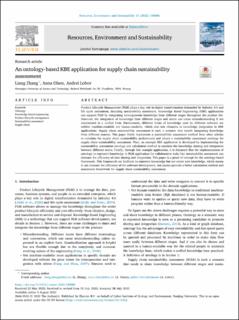| dc.contributor.author | Zhang, Liang | |
| dc.contributor.author | Olsen, Anna | |
| dc.contributor.author | Lobov, Andrei | |
| dc.date.accessioned | 2023-03-08T08:20:32Z | |
| dc.date.available | 2023-03-08T08:20:32Z | |
| dc.date.created | 2022-08-05T20:27:37Z | |
| dc.date.issued | 2022 | |
| dc.identifier.citation | Resources, Environment and Sustainability. 2022, 10 . | en_US |
| dc.identifier.issn | 2666-9161 | |
| dc.identifier.uri | https://hdl.handle.net/11250/3056913 | |
| dc.description.abstract | Product Lifecycle Management (PLM) plays a key role in digital transformation demanded by Industry 4.0 and life cycle assessment, including sustainability assessment. Knowledge Based Engineering (KBE) applications can support PLM by integrating heterogeneous knowledge from different stages throughout the product life. However, the integration of knowledge from different stages and teams can cause misunderstanding if not represented in a unified form. Furthermore, different forms of knowledge used by different software are neither machine-readable nor human-readable, which also sets obstacles to knowledge integration in KBE applications. Supply chain sustainability assessment is such a scenario that entails integrating knowledge from different sources. This paper firstly implements a sustainability assessment method from other scholar to calculate the supply chain sustainability performance and adapts a sustainability assessment ontology for supply chain sustainability assessment. Then, an example KBE application is developed by implementing the sustainability assessment ontology and calculation method to simulate the knowledge sharing and integration between different teams. Finally, through this example application, it is discussed that the implementation of ontology to represent knowledge in PLM application for collaborative tasks like sustainability assessment can increase the efficiency of data sharing and integration. This paper is a proof of concept for the ontology-based framework. This framework can facilitate to represent knowledge but not create new knowledge, which means it can increase the efficiency of the software development, but cannot provide a better calculation method and assessment framework for supply chain sustainability assessment. | en_US |
| dc.language.iso | eng | en_US |
| dc.publisher | Elsevier B. V. | en_US |
| dc.relation.uri | https://doi.org/10.1016/j.resenv.2022.100086 | |
| dc.rights | Navngivelse 4.0 Internasjonal | * |
| dc.rights.uri | http://creativecommons.org/licenses/by/4.0/deed.no | * |
| dc.title | An ontology-based KBE application for supply chain sustainability assessment | en_US |
| dc.title.alternative | An ontology-based KBE application for supply chain sustainability assessment | en_US |
| dc.type | Peer reviewed | en_US |
| dc.type | Journal article | en_US |
| dc.description.version | publishedVersion | en_US |
| dc.source.volume | 10 | en_US |
| dc.source.journal | Resources, Environment and Sustainability | en_US |
| dc.identifier.doi | 10.1016/j.resenv.2022.100086 | |
| dc.identifier.cristin | 2041432 | |
| dc.source.articlenumber | 100086 | en_US |
| cristin.ispublished | true | |
| cristin.fulltext | original | |
| cristin.qualitycode | 1 | |

